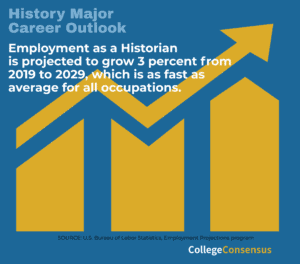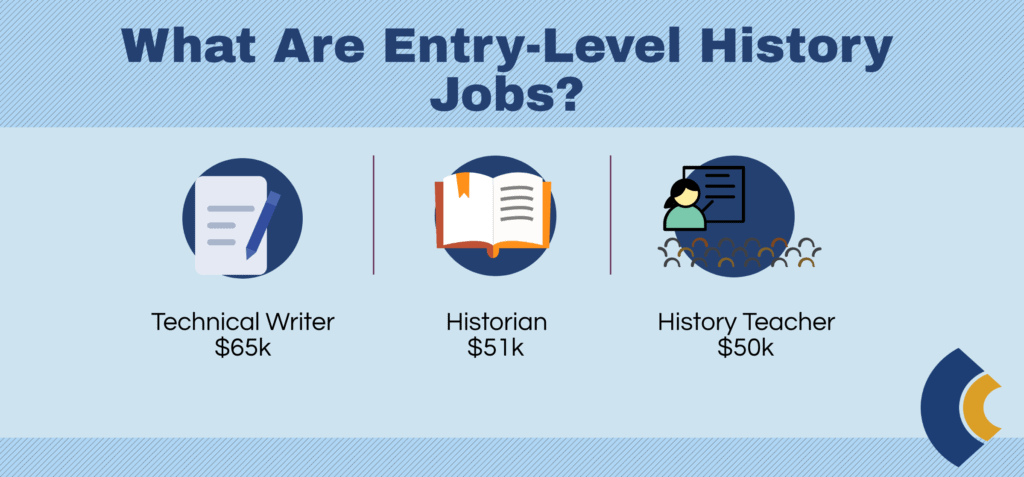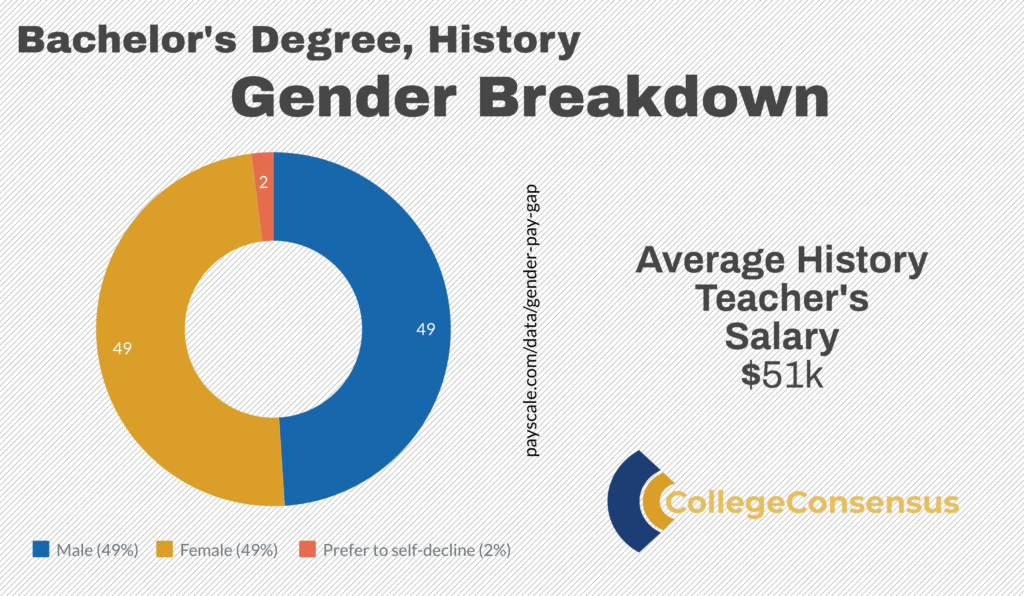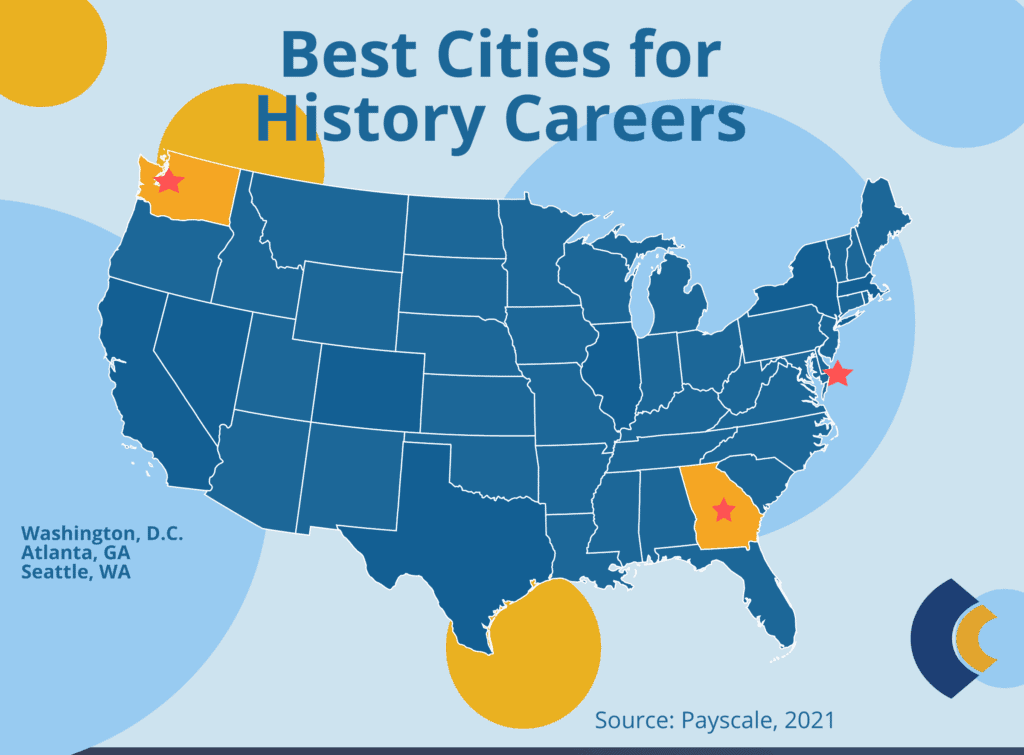A historian is someone who studies, documents, writes about and teaches others about the past. While historians themselves have a storied history, the term came to denote a professional occupation in the 1800s. Because it’s a professional occupation, there are numerous paths someone can take if they pursue a history degree.
How Do I Become a Historian?
So, how do you become a historian? If you wonder how do I become a historian or what can you do with a history degree, there are numerous answers. Since history is a general term that encompasses literally everything that has come before the present day, there are a variety of places to fit in as a historian. However, how to become a historian starts with obtaining a history degree.

Many people assume that historians have a limited number of occupations where they can fit in. However, there are a wide number of occupations, industries, niches, and places where someone with a history degree can earn an excellent salary while indulging in a subject that they love.
How to become a historian often starts with a passion for history, even if it’s only a single aspect of history. Historians study the past by researching documents, artifacts, and events. They can take what they learn and use it to help report on how the significance of those events led to current day issues or how interpretations of those events can help with current government procedures.
The historian shines a light on the past to give context and understanding to the present. These sound like lofty endeavors, but they require real work, expertise, and people who ask how to become a historian so they can help make those endeavors work.
What Can I Do with a History Degree?
Historians work under the umbrella of social sciences, which includes the study of societies and the relationships between the people who make up those societies. As such, history also plays a role in other disciplines, such as:
- Economics
- Linguistics
- Archaeology
- Anthropology
- Psychology
Many other disciplines are on this list as well. This means that someone who wants to know how to become a historian should also have an interest in some of these other disciplines as well, since other branches of the social sciences can and often do play a role in the study of history in all its forms.
In addition, history is also part of the umbrella group of disciplines known as humanities. The academic disciplines that constitute humanities are all about studying human society and culture. History plays a middle ground between social sciences and humanities, and can often tie things together between the two groups of disciplines.
Beyond the benefits of a history degree in general, applicants should remember that a study of history can lend itself well to many other disciplines and pursuits. These points all make history a worthwhile endeavor and applicants will find that they can apply what they learn to a career path that can take them a long way, even if they don’t specifically stay in the history field.
History degrees contain a high level of specialization. Studying the past lends itself to niches, so a progression through history degrees, from associates to doctorates, will often require applicants to drill down to the type of history they most want to pursue. For example, there are career paths for those who want to study World War II history just as there are career paths for those who want to study the political history of a particular foreign nation. This is one reason those who want to know how to become a historian should start by considering what history they most want to explore.

What Type of Accreditation Should an Online History Degree Have?
As with any degree, accreditation plays an important role when it comes to the quality of education someone can expect from a degree program. This also applies to accredited online degrees in history. What is an accredited online history degree? Accreditation means a college, university, program, or other forms of higher education have voluntarily submitted their operations for review from an accrediting body that sets standards in education.
Many institutions derive their reputations from their accredited status, so it’s always a good idea to choose a program that has accreditation from a reputable accrediting body. In some cases, potential employers may not even fully accept a degree if it doesn’t have accreditation. The Department of Education gives recognition to accrediting agencies who, in turn, give their approval to institutions that warrant it.
For many schools, regional accreditation is enough for an applicant to assume they will receive a good education. The regional accrediting bodies tend to give accredited status to schools and universities, rather than to individual programs within that school or university. This means an applicant can expect a good overall education at a reputable facility. Nevertheless, some accrediting groups, usually national accrediting bodies, will give their stamp of approval to individual programs that meet their high educational requirements.
Applicants who can find schools or programs with multiple types of accreditation are usually safe. An online history degree accredited by a reputable accrediting body will ensure the applicant will graduate with a degree that’s accepted at other schools, should they want to pursue further education, and by employers and entities that hire people with history degrees. Students who want to transfer credits between institutions may find they can only do so if those credits came from a regionally accredited school or an accredited online history degree program with accreditation status from one of the bodies recognized by the US Department of Education.
An online history degree accredited by the National Council for the Social Studies or one of its affiliates often means the applicant can expect a high-quality education. Programs with the backing of the American Historical Association should also rise in the lists when an applicant is considering an accredited online history degree.
Accreditation isn’t just about the quality of the education, it’s also about the quality of the staff and professionals involved with the education. Teachers, professors, and others that play in role in educating students will also have vetting to ensure they’re teaching the right and relevant information in the right way. Standards also ensure that even in different institutions, students can still expect to receive just as high quality an education as they would from any other accredited program.
What Are the Benefits of History Associate’s Programs?
An online associate’s degree in history can provide an excellent entry-level degree for students on any career path. At this level, it’s often more about the fact the graduate has a degree in general than it is about that degree representing a history degree specifically.
Education at this degree level will often center on examining important historical events with objectivity. The online history associates degree program will offer a more basic history education which students can use as a foundation for pursuing further or specialized studies.
The classes and electives will often help students look at historical activities critically as well as learn how to use what they learn to ask the right questions, conduct the appropriate research, and form conclusions they can defend properly.
An associates degree in history online can help students broaden their horizons and teach them how to think through issues and developments to formulate a measured and detailed response. These critical thinking skills can apply to any career path the student will want to go on.
What Are the History Associate’s Jobs and Salary?
Despite online history associate degrees offering a more basic history education, there are several associate’s degree in history jobs that become available to graduates. While this degree often works best as a stepping stone toward a bachelor’s degree, it’s also possible to find various types of work with just an associate’s degree in history.
Some associates degree in history jobs can include:
- Tour guides
- Journalists
- Writers
- Editors
- Archivists
- Teaching assistant
- Research assistant
Many occupations not directly related to history will also offer associate’s degree in history jobs because of the curriculum associated with history degrees. For example, many of the course hours for the degree can include classes related to politics, foreign languages, all types of humanities and social science studies, communications classes, and others.
This means applicants with their associates degree can still look promising to employers of all types and even some niche industries that appreciate having employees who know a little something about a particular culture and how to think critically.
The history associate’s salary possibilities can vary depending on where they work, who they work for, and what’s in demand for any location or business. For example, a tour guide can earn around ~$27k to ~46k depending on the industry they’re working in. By contrast, a social science research assistant can earn between ~$45k and ~$60k as a history associate’s salary, once again, depending on the industry they’re working in.
It’s certainly possible to earn a decent wage with an associates degree in history, but applicants may have to work hard to stand out above those with higher degree types or educations in cross disciplines. Breaking into research as an assistant is a good way to go, but research jobs aren’t always plentiful in all areas.
Nevertheless, work is out there, and various types of it as well, so applicants can use their degree to start down a career path of their choosing.

What Are the Benefits of History Bachelor’s Programs?
Online history degrees that start off as bachelor’s programs are typically what most people pursue when they want a history degree. While there’s much you can do with an associate’s, it’s typically an online bachelor’s degree in history that offers the most benefit for those who want to do something with their history degree specifically.
Just as the associate’s online degree in history can represent a stepping stone toward earning a bachelor’s, a bachelor’s in history online plays the same role in earning a master’s. However, with just a bachelor’s online degree in history, applicants will have a tremendous number of opportunities available to them.
Bachelor online history degrees focus on key historical topics and time periods. In addition, these programs tend to delve deeper into how to evaluate history and historical writing. Beyond that, students will start to look at how history affects the present and other ways history fundamentally affects the world.
Students will also have to spend some time on a research paper or project that demonstrates their knowledge of historical concepts or their proficiency in a particular historical subject. A graduate with a bachelor’s online degree in history can move on to further education or join the workforce on any of several career paths. They can also do both these things.
Online history degrees offer a chance for students to increase their knowledge of how the world works as well as the people in it. This is one of the reasons why there are so many career avenues someone can take with an online degree in history. The courses associated with this degree type include electives and general education classes that help to broaden the overall understanding of how history affects everything.
What are History Bachelor’s Jobs and Salary?
Jobs with a history degree at this level include all the jobs available with an associate’s degree but also includes far more potential career paths as well. The job prospects with a history degree can now include things like:
- Schoolteacher and tutors
- Museum curators
- Museum technicians
- Managers and supervisors
- Paralegals and legal assistants
- Anthropologist assistants
- Archaeologist assistants
Practically any job in the communications field will welcome history degree majors. Jobs with a history degree are rather diverse since, unlike many other liberal arts degrees, a history degree isn’t specifically tied to a career path of one type or another.
Jobs with a degree in history can look like someone working as a reporter on foreign relations or someone managing a marketing firm. Some of the best jobs with a history degree will include teaching positions and assistant positions as both these types of jobs with a history degree can lead to better opportunities as applicants gather experience.
History degree careers and salaries can vary widely. The average salary for a historian will depend on the occupation the applicant chooses and the industry they want to work in. Jobs with a degree in history exist in both the public and private sectors, and history degree jobs salary can also depend on location.
Some places may hire someone at a lower starting salary if they have an associate’s degree rather than a bachelor’s. But some other places may only hire someone with a master’s degree for the same type of position in another locale. So, when asking what is the salary of a historian or about the typical history degree salary, it’s better to look at individual occupations.
Archivists, curators, and museum workers can earn around ~$49.8k, which is listed as the median pay for these occupations by the OOH. According to Glassdoor, a history teacher can make ~$44k on average. However, a history teacher in New York City can earn up to ~$90k.
At this level, the average salary for a historian is typically a moot point, because the average salary of a historian doesn’t really become a consideration until an applicant has earned their master’s degree. At that level of education, students graduate as historians and can start to look at a history degree salary for historians specifically.
What are the Benefits of History Master’s Programs?
A master’s in history online becomes the point where someone can typically declare themselves a historian. An online master’s in history is a graduate program and is usually pursued by people who want to work as a historian of one type or another specifically.
To earn an online master’s degree in history, students will spend time delving deeply into a historical concentration while learning to apply honed analytical skills to target specific aspects of that concentration. Like most master’s programs, an online master’s in history is all about specialization.
Master’s degrees in history online will usually require applicants to have a bachelor’s degree from an accredited program, GRE results, a minimum GPA, and possibly a writing sample. Of course, requirements can vary between institutions, so applicants should spend some time looking over the requirements for any masters in history online program they’re considering.
Master’s degrees in history online can also come in various forms. Applicants can pursue an online master’s in history specifically, but they can also consider a master’s program for a specialized course of studies, such as an online master’s in history of science and medicine, or an online masters in history of art and culture.
No matter what avenue an applicant seeks, earning an online masters degree in history shows they’re very serious about the history field. Still, having a master’s degree also allows applicants to pursue various other career choices, but because they’re choosing history specifically, it’s generally assumed their career paths will line up with occupations that respect that historian title most. Earning a masters in history online is also a necessary step for those who want to go further and pursue their Ph.D.
What are the History Master’s Jobs and Salary?
Many may wonder what can I do with a master’s in history that I can’t do with a bachelor’s? Jobs with a master’s in history generally include every job obtainable with a bachelor’s degree, but also all those occupations that are simply unobtainable at that level.
For example, a bachelor’s degree is great for becoming a research assistant, but the master’s in history jobs include researchers, so gaining more experience can help someone move up to research work. Jobs with a masters in history can include:
- Historians
- Researchers
- High school and specialty teachers
- Political scientists
- Archaeologists
- Politicians
- Consultants
Potential applicants may notice many of these positions are terms that encompass several career types. So, the question of what can I do with a masters in history can be answered just by looking at all the professional masters in history jobs that are out there.
What can you do with a master’s in history? That’s probably best answered by setting a career goal before pursuing a master’s degree. Jobs with a master’s in history also come with a master’s in history salary that many people will find attractive. Unlike previous degree types, looking at a master’s degree in history salary can also now include the title of historian.
The OOH lists median pay for historians as ~$63.6k with those who work for the federal government at ~$97.8k. Some other masters of history jobs and master’s degree in history careers include political scientists who can earn ~$122k, economists who can earn ~$105k, and sociologists who can earn ~$83.4k.
There are many more history masters jobs and pay varies based on various factors. These jobs for history master’s graduates will also pay based on experience, so working towards higher salaries is always a possibility for those who want to know what to do with a master’s in history.

What are the Benefits of History Doctorate Programs?
An online PhD in history represents a level of dedication to history and related disciplines that shows an applicant wants to position themselves as a leader in the field. Applicants can begin the journey through an online history PhD program, but they need to make sure they are serious about the endeavor.
A PhD in history online takes time and effort. When an applicant pursues an online PhD in history, they are pursuing a terminal degree. A terminal degree is one that represents the highest degree awarded on a particular academic path.
When seeking an online history PhD, applicants should look closely at the requirements. PhD programs are notoriously hard to get into, and a PHD in history online program, while usually more accessible, can still have very strict requirements for entry.
What are the History Doctorate Jobs and Salary?
Jobs with a history PhD can include all potential occupations accessible by those with a master’s. However, there are some occupations that are only history PhD jobs. In most cases, PhD in history jobs include:
- University professors
- Anthropologists
- Sociologists
- Academic publishers
- College administrators
Jobs with a history PhD also include more prestigious or higher paying versions of jobs available to people with a master’s degree. Nevertheless, those who pursue a PhD typically want history PhD jobs that benefit most from those extra years of education.
One potential issue with the history PhD job market is that the competition for history PhD job prospects can mean a lack of work. Because of this, many graduates may also consider history PhD jobs outside academia.
History PhD salary can vary, but the Bureau of Labor Statistics points out that people with a doctoral degree earn the highest salaries on average while also having one of the lowest unemployment rates. Whether inside or outside of academia, a PhD in history salary can average out to ~$78.9k with some making far more than that depending on the industry, location, and specific job title.
Related Rankings:
Best Online Associate’s in History
Best Online Bachelor’s in History